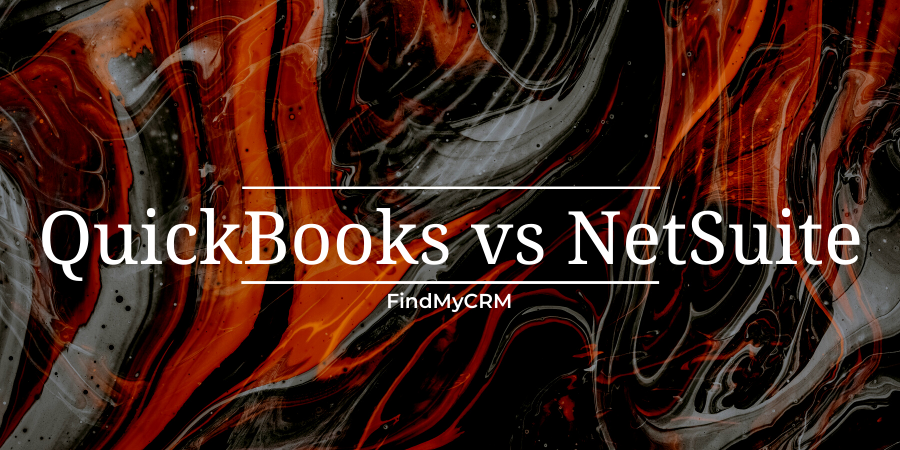About QuickBooks
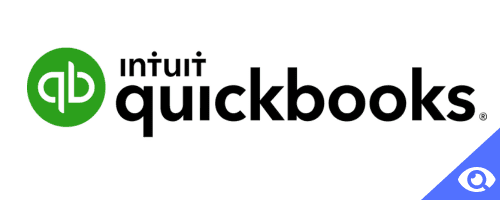
QuickBooks is a starting point for many small companies in need of a bookkeeping program, thanks in part to its low price point. Users can keep track of their income and expenses, connect their bank and credit card accounts, and generate financial reports such as income statements and balance sheets. QuickBooks Online is a stand-alone, cloud-based accounting software program. QuickBooks Enterprise includes some inventory management functions but is quite limited overall and relies on third-party integrations for advanced functions.
About NetSuite

NetSuite is a cloud-based business management solution that automates important processes and offers real-time visibility into operational and financial performance. NetSuite ERP provides companies with clear visibility into their data and greater control over their businesses with a single, integrated suite of apps for managing accounting, order processing, inventory management, production, supply chain, and warehouse operations.
QuickBooks vs NetSuite: Brief Comparison Chart
| Criteria | QuickBooks | NetSuite |
| Rating | 4.3/5 | 4.1/5 |
| Ease of Use | ⭐⭐⭐⭐⭐ | ⭐⭐⭐⭐ |
| Support |
|
|
| Integrations | The unknown number of integrations | 650+ |
| Pricing | Custom | $15 for one user to $200 for 25 users |
QuickBooks vs NetSuite: Feature Comparison

Although QuickBooks and NetSuite are both popular accounting software systems, they each offer their own variety of advantages and disadvantages. QuickBooks is better suited for small firms with few transactions, whereas NetSuite is a more powerful system that can manage a higher volume of transactions and scale to meet the needs of larger enterprises. So, let`s take a look at their features.
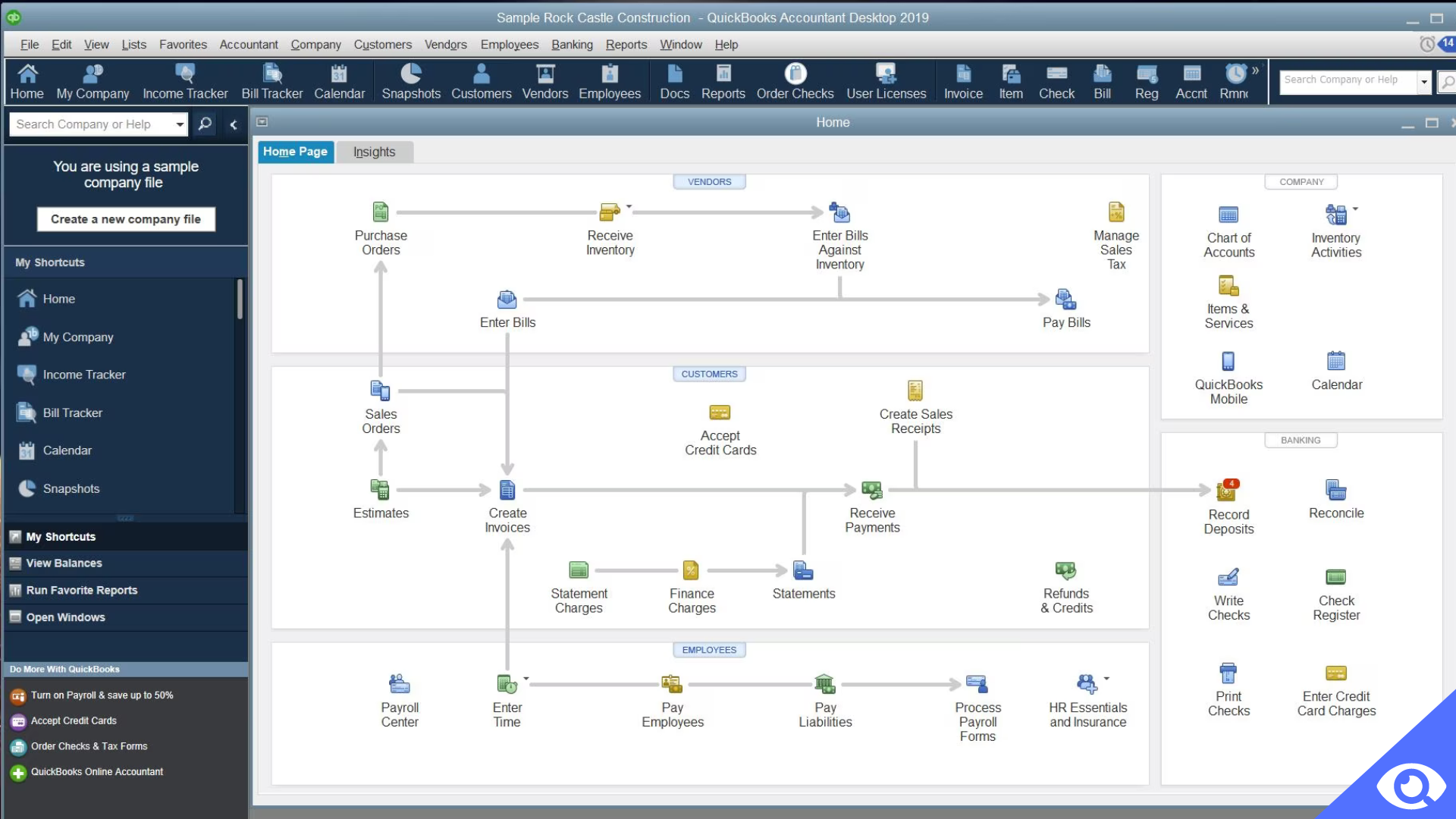
QuickBooks Features
QuickBooks by Intuit is an excellent and feature-rich option for startups seeking a straightforward solution for various accounting and financial management activities.
QuickBooks Online is a cloud software platform that provides solutions and tools for managing small business tasks such as invoices, bill payments, native reports, tracking cash flows, and so on. QuickBooks offers four different plan options: Simple, Essentials, Plus, and Advanced. With each plan, the advancement of features improves. Here are some key QuickBooks Online features:
- Cash Management: QuickBooks supports online payments and invoice deposits, as well as the management of monthly bank statements.
- Bill Management: It makes it easy to manage cash flow, pay bills online, schedule future payments, and remember due dates.
- Payroll Management: It creates paychecks, formats accounting reports, clears taxes, tracks and handles payroll, and so on.
- Revenue and Sales Management: It is in charge of the company's income, including sales and invoice management.
- Automated Tax Payment: Tax filing is simplified with QuickBooks Online's automatic tax payments and form filing features.
- Financial Reports: QuickBooks Online offers basic financial reports such as profit and loss and balance sheet reports, customer statements, cash flow statements, and A/R and A/P aging reports.
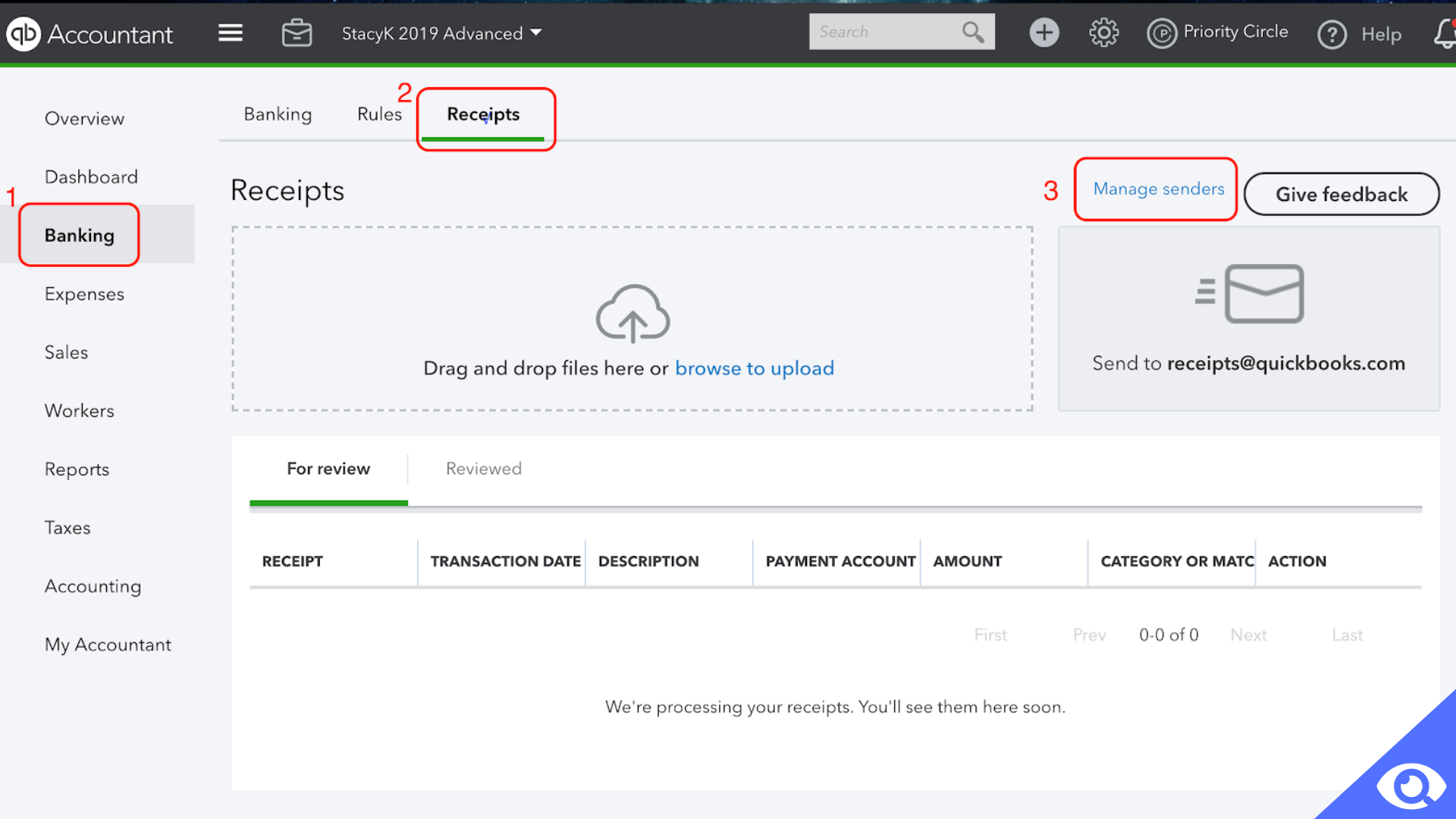
NetSuite Features
Because of its comprehensive, dynamic features, NetSuite cloud accounting software is a popular choice for businesses. For example, it combines financial control with role-specific security to ensure duty segregation. It also provides businesses with native, real-time reporting, giving them a 360-degree view of their finances.
NetSuite ERP's all-in-one cloud-based features give it an advantage over other legacy systems designed primarily for on-premises use. NetSuite's enterprise-level solutions make it an attractive alternative for businesses wanting to scale while saving money and keeping room for development.
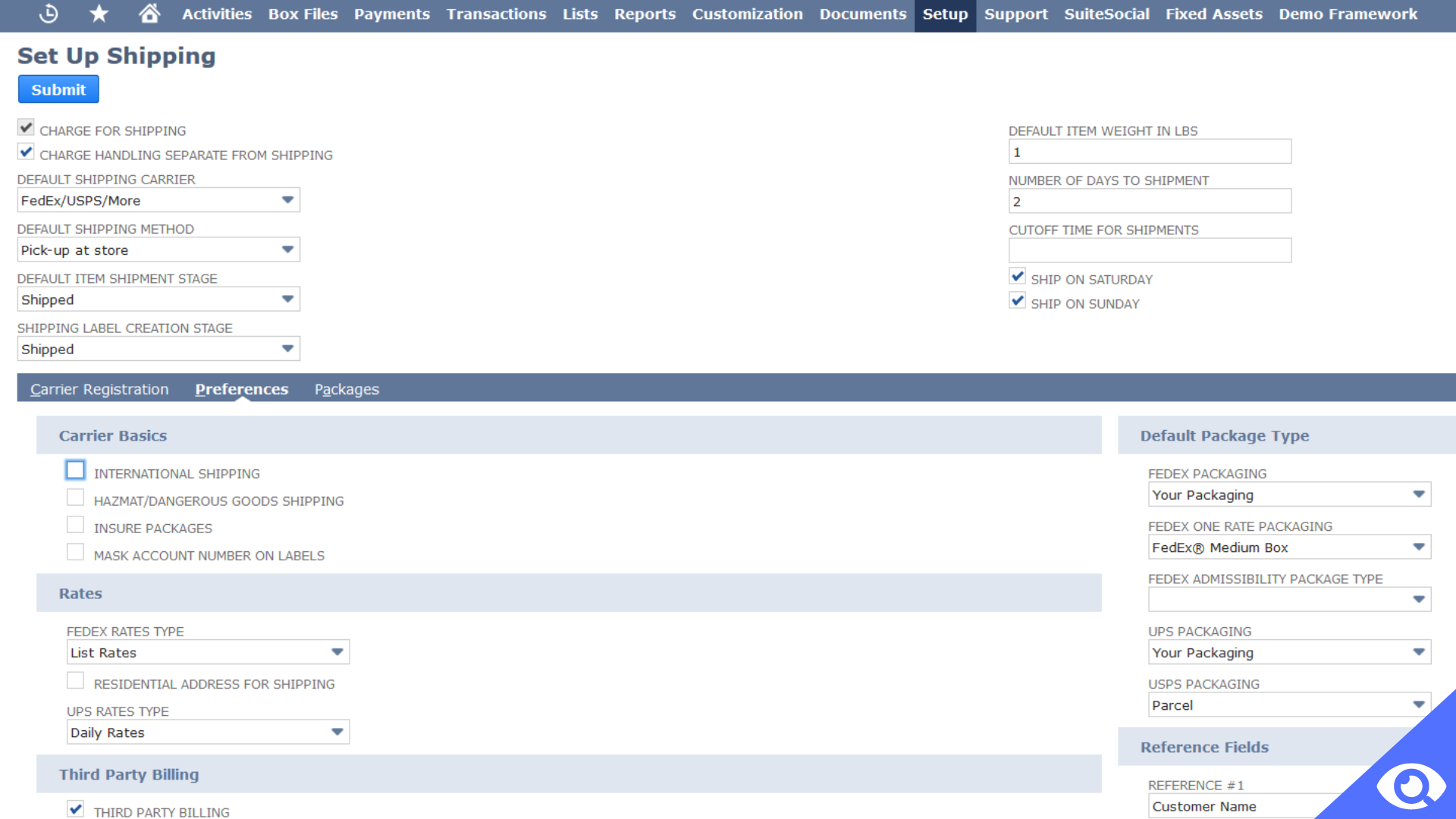
Here are some of the important NetSuite ERP features that identify it as accounting software rather than just a bookkeeping solution:
- General Ledger: It simplifies accounting by automating accounting operations and tailoring them to specific business requirements.
- Accounts Payable and Receivable: It assists in basic accounting control, such as tracking payables and receivables, conducting bank reconciliation, and so on.
- Fixed Asset Management: It monitors and manages the asset lifecycle, handles critical asset data, and tracks lease agreement details.
- Billing and Invoicing: The system automates invoicing and payment collection operations to ensure on-time payments and reduce human error.
- Multi-tax Compliance: An all-in-one tax management solution that creates thorough reports, helps with transaction analysis, and automates calculations in real time.
- Inventory Management: This module tracks orders, available products, deliverables, and sales to update inventory information in real time.
- Financial Planning & Analysis: It assists in planning and analyzing current circumstances and future situations in order to create a realistic future objective.
- Budgeting & Forecasting: In the context of budgeting and forecasting, this tool analyzes many variables, historical data, and future outcomes.
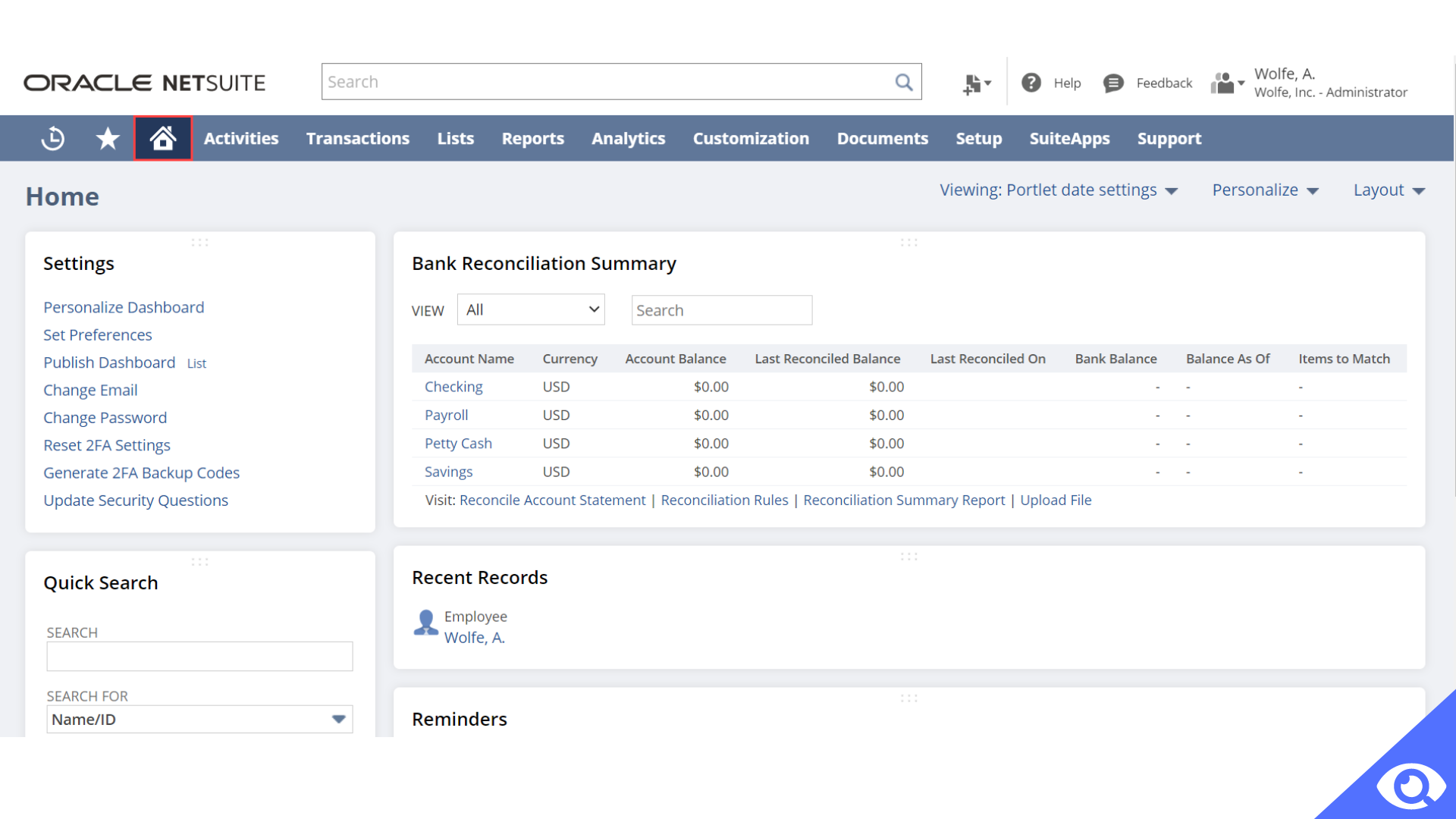
QuickBooks vs NetSuite: Usability Comparison
QuickBooks is designed for small businesses. As a result, its financial management tools are quick, simple, and easy to use with basic guidance and training. Netsuite, on the other hand, has a more advanced set of complex capabilities. Although they are simple to learn and use, the processes and overall system can be overwhelming.
QuickBooks is used for simple tasks such as payroll and invoicing. Thus, it doesn't require a complex program. Nevertheless, NetSuite can be used for ERP (Enterprise Resource Planning) as well as CRM (Customer Relationship Management). Its comprehensive platform is full of features, however, it ranked lower in terms of ease of navigation and usability.
| Dashboard | |
| QuickBooks | NetSuite |
| Profit/Loss: This is where you can customize your profit and loss. | KPIs: This section details your spending, income, profit, sales, transactions, A/Rs, and A/Ps. |
| Navigation bar: It contains links to sections such as report creation, project tracking, and making customer invoices. | General Accounting: Accounts and entries are linked to lists, reports, and transactions via clickable links. |
| Bank Accounts: By adding your credit cards and banking accounts, you can view both your QuickBooks balance and your account balance in other banks. | Commission Trend: It displays a monthly graphical report of your company's commission change. |
| Cashflow: You can tailor the report to your invoices, income, and transactions based on the period. | Operating Cash Flow: This section's graph format enables customization. |
| Sales: The graph represents your fiscal year-to-date sales data. | SaaS Metrics: It allows you to track new customers, bookings, sales, and other business metrics. |
| Income: This section displays your A/R report, invoices, and income. | Reminders: Your essential notices are highlighted here. |
| Expenses: You may see an overview of your spending by category here. | Top 10 Ranking: Your top ten customers are presented under A/R Aging Summary. |
QuickBooks vs NetSuite: Support

In addition to their comprehensive knowledgebases, NetSuite and QuickBooks provide live support to their customers via phone and chat. Both offer important assistance resources, such as free access to community forums, video tutorials, and webinars. However, unlike NetSuite, QuickBooks' phone assistance is only available during regular business hours.
All NetSuite subscriptions include Basic Support, with Premium and Advanced Support available to satisfy extra support needs. Each offers unique service levels and capabilities, from online case submissions to performance monitoring. Another option for QuickBooks users is to find a QuickBooks ProAdvisor or to sign up for QuickBooks Live, which offers online bookkeeping support for an extra fee.
[Related Article: Xero vs QuickBooks]
QuickBooks vs NetSuite: Integration with Third-Party Programs

QuickBooks Online provides over 650 business app integrations, including two that can be accessed directly from the platform:
- QuickBooks Payroll: This software allows you to pay and manage your employees all in one place. Payroll, tax filing, health benefits, workers' compensation, and other human resources (HR) features will be accessible to you.
- QuickBooks Time: You can allow employees to track their time from any place and on any device. This data will sync in real-time with your QuickBooks account, streamlining your payroll.
Some third-party QuickBooks Online integrations also include:
- Customer management: Insightly, WORKetc, Aero Workflow
- Inventory management: Shopify, TradeGecko, SOS Inventory
- Budgeting/forecasting: Cash Flow Frog, Budgeto, Fathom, Qvinci
- Payroll: Square Payroll, Gusto, Wagepoint, RUN Powered by ADP
- Sync data: Plooto, ReceiptBank, Hubdoc, AutoEntry
- E-commerce: PayTraQer, Freedom Merchants, Stripe by Connex
NetSuite, on the other hand, reduces the need to connect ERP, CRM, and e-commerce platforms because it is fully integrated. It also provides additional solutions by collaborating with third-party integration providers to provide SuiteCloud Connect, a collection of packaged solutions for integrating with main enterprise applications and systems such as Salesforce, SAP, Oracle, and Google Apps. NetSuite also provides training courses and consulting services for users who need help with integration projects.
QuickBooks vs NetSuite: Mobile App
While both have robust mobile apps, NetSuite outperforms the competition with a more comprehensive user interface (UI) that includes KPIs and strong report customization capabilities. It also features simple expense reporting, call logging, and time tracking. It's designed with important workflows, supports push alerts for time-sensitive operations, and is available for both iOS and Android. It even allows you to access saved searches instantly and tailor reports by adding fields, grouping levels, and customizing formulas.
QuickBooks Online also has a powerful mobile app for iOS and Android users, allowing them to record costs, invoice clients, enter transitions, and send reports. It also transforms your phone into a receipt scanner, recording the billable expense in your books and attaching your receipt to the invoice for reimbursement. If you're an Android user, you may send an invoice through WhatsApp, and you'll receive an instant notification when a client views or pays it.
QuickBooks vs NetSuite: Pricing
QuickBooks Online has five monthly subscription plans, ranging from $15 for one user and basic capabilities to $200 for up to 25 users and advanced features. Its cost is clearly laid out with the functions available for each level, and you can learn more about the differences by comparing QuickBooks Online.
Meanwhile, NetSuite pricing must be determined through a tailored quote based on the size of your organization, annual revenue, and the different modules that will be employed. NetSuite is far more expensive than QuickBooks Online, but it is targeted toward larger businesses looking for a comprehensive ERP system rather than just accounting software.
Alternatives to QuickBooks and NetSuite

Microsoft Dynamics 365
Microsoft Dynamics 365 has almost identical capabilities to NetSuite, with the extra benefit of being created to integrate with Microsoft Office's suite of products. If you are looking for a fully customized solution for your organization, Dynamics is designed to be customized to meet your specific requirements. It is also less expensive than NetSuite ($70 per user per month to begin, with additional costs based on required functionality).
The disadvantage is the lack of readily available accountant support. Because Dynamics is not as widely used as QuickBooks, you will likely have additional training expenses for any team members who use it.
Xero
Xero is another popular accounting software that provides a lot of flexibility and customization. Xero also integrates with over 800 third-party apps, including payment gateways, CRM software, and project management tools, giving businesses more flexibility in managing their finances and other business processes. For more information, read our QuickBooks vs Xero comparison.
Sage Intacct
Sage Intacct is enterprise-level software that provides comprehensive financial management capabilities. Sage Intacct, like NetSuite, is a cloud-based ERP with many similar functions (inventory and order management, financial management, and a CRM component). In order to have a complete business management solution, you will need to use third-party integrations. That fact differentiates Sage Intacct from NetSuite but is similar to QuickBooks Online Advanced.
Because it is designed to work with integrations from third parties, Sage can keep Intacct's upfront costs lower than NetSuite's. But businesses may discover that the cost of third-party apps — or the loss of productivity that comes with a patchwork solution — offsets the upfront savings.
Wrapping Up
QuickBooks Online is the perfect accounting software solution for small businesses across various industries. Its user-friendly interface and flexibility make it a popular choice among entrepreneurs. While NetSuite also offers integration capabilities, QuickBooks Online relies on third-party software integrations to provide a wide range of features, such as inventory management and bill payment.
On the other hand, NetSuite is not the most suitable option for small firms with simple accounting needs due to its high price point. However, if your company is expanding internationally and requires an enterprise resource planning (ERP) platform to manage all aspects of your business, NetSuite can be an excellent solution that will pave the way for your success.
In conclusion, both QuickBooks Online and NetSuite have their advantages and target different types of businesses. QuickBooks Online is ideal for small businesses with basic accounting needs, offering user-friendly software and flexibility. On the other hand, NetSuite is a robust ERP system that caters to larger businesses with complex requirements, particularly those expanding internationally.
